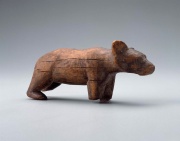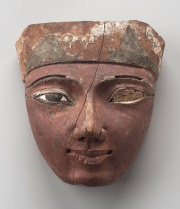Difference between revisions of "Crack"
(username removed) |
|||
| Line 2: | Line 2: | ||
== Description == | == Description == | ||
| − | A visible separation on a surface that extends through one or more layers. Cracks may be due to stress, pressure, temperatures, or humidity variations or mechanical defects. Cracks are described by the size (hairline, wide) and direction (parallel, radial, spiral, etc.). See for | + | A visible separation on a surface that extends through one or more layers. Cracks may be due to stress, pressure, temperatures, or humidity variations or mechanical defects. Cracks are described by the size (hairline, wide) and direction (parallel, radial, spiral, etc.). See for example [[crackle]] and [[crazing]]. Geologic terms for cracks include fault, gap, fracture, and fissure. A crack in a textile is mechanical defect due to a missing filling thread. |
== Synonyms and Related Terms == | == Synonyms and Related Terms == | ||
Revision as of 13:35, 13 January 2014
Description
A visible separation on a surface that extends through one or more layers. Cracks may be due to stress, pressure, temperatures, or humidity variations or mechanical defects. Cracks are described by the size (hairline, wide) and direction (parallel, radial, spiral, etc.). See for example Crackle and Crazing. Geologic terms for cracks include fault, gap, fracture, and fissure. A crack in a textile is mechanical defect due to a missing filling thread.
Synonyms and Related Terms
crevice; chink; gap; cleft; fissure; fracture; cleavage; separation
Additional Information
º ICOMOS Stone dedegradation terms may be found at: http://international.icomos.org/publications/monuments_and_sites/15/pdf/Monuments_and_Sites_15_ISCS_Glossary_Stone.pdf Illustrated glossary on stone deterioration patterns º For information on cracks caused by humidity and temperature see: M.F. Mecklenburg, Smithsonian Museum Conservation Institute, "Determining the Acceptable Ranges of Relative Humidity And Temperature in Museums and Galleries" http://www.si.edu/mci/downloads/reports/Mecklenburg-Part1-RH.pdf Part 1, Structural Response to Relative Humidity and http://www.si.edu/mci/downloads/reports/Mecklenburg-Part2-Temp.pdf Part 2, Structural Response to Temperature
Additional Images
- DT 8-25-2004-Crack detail
Crack detail



